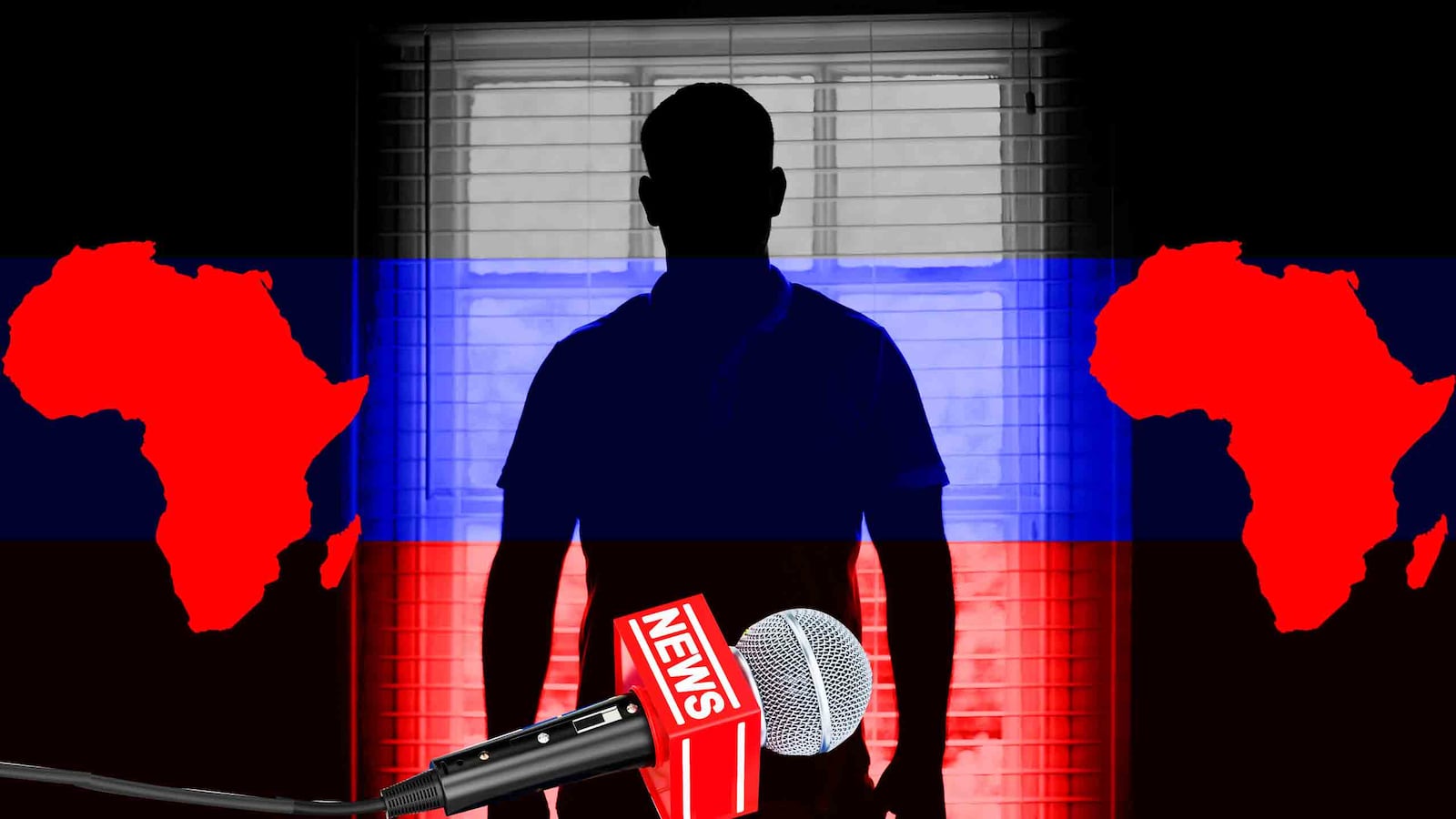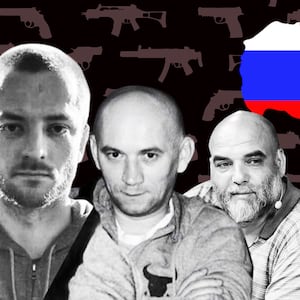ABUJA, Nigeria—As Louis Kottoy, a freelance journalist in the Central African Republic (CAR), stepped out of his home in the heart of the country’s capital, Bangui, at the end of September, three men armed with pistols rushed him, beat him up, and took away his phone and laptop. The beating he received left him with a dislocated left shoulder and a cut above his right eye that required three stitches.
Kottoy, whose work has appeared on a couple of local publications, believes the attack was connected to his investigation into the murder of Russian journalists Orkhan Dzhemal, Alexander Rastorguyev, and Kirill Radchenko, who were killed in July while making a documentary film about mercenaries employed in the country by the Wagner Group, a private military contractor linked to the Kremlin. According to Kottoy, the men who attacked him accused him of using his phone and laptop to “create problems for some people,” and that was why they were taking them away from him.
“They said I began to ask for trouble when I started going to places I shouldn’t be and asking questions that were none of my business,” Kottoy told The Daily Beast. He had been interviewing people in the town near the site where the Russians were killed. “I knew this was about the investigation because the interviews I have carried out recently have only been related to that incident.”
The day before the assault on Kottoy in Bangui, he had received a phone call from an anonymous but “friendly” woman who advised him not to continue with his findings, as some people were becoming uncomfortable with his work.
“The caller didn’t give details about these people who were not comfortable with my work and why they were bothered,” said Kottoy. “She said she was concerned about me and wanted me to be careful.”
The attack on Kottoy is just one incident that highlights the danger associated with digging into the killing of the Russian journalists, who were shot dead with automatic weapons after being ambushed outside the town of Sibut.
Two weeks before the Kottoy was beaten up and his equipment seized, Pyotr Verzilov, a member of anti-Kremlin protest group Pussy Riot, reportedly was poisoned while awaiting results from a private investigation into the Sibut murders.
Unable to see, hear or walk at the time and suffering from hallucinations, Verzilov—who is best known as a spokesman for Pussy Riot and also as the publisher of Media Zone, the group’s journalistic project—was rushed to a hospital in Moscow after attending a court hearing about a different matter. He reportedly was due to receive the results of the investigation on the day that he fell ill.
The record of killings targeting Russians regarded by President Vladimir Putin as “traitors” or “enemies,” whether journalists, human right activists, corruption investigators or defectors from the Russian intelligence services, makes it relatively easy to point fingers at the Kremlin in the poisoning of Verzilov. But even in the Central African Republic—where Valery Zakharov, a Russian national, serves as President Faustin-Archange Touadera’s national security adviser—there is suspicion of Moscow’s influence in attempts to cripple investigations into the July murders of Dzhemal, Rastorguyev, and Radchenko.
In Sibut, where the Russian journalists were killed, soldiers from the Central African Armed Forces (FACA), who have been receiving training from Russian instructors (PDF) currently deployed in the town, have reportedly been warning people living close to the spot where the bodies were found not to speak to the media regarding the incident. Some people who have been to Sibut recently told The Daily Beast that residents were warned by soldiers that they would be punished if they gave interviews about the killings.
“Some said they have recently seen these FACA forces in company of white soldiers,” says Glory Tiku, a Cameroonian journalist and rights activist who was in Sibut in September. “No one wanted to speak because they feared FACA soldiers, who can sometimes be brutal on civilians, will come after them.”
“I didn’t see the soldiers myself, but some neighbors informed that they were in the compound a day after the incident to warn people not to grant press interviews,” said Bangui-based Didier Ndong, who visited his mother in Sibut a week after the Russians were killed. “The order made people even afraid of leaving their homes.”
It is not clear who gave the order to FACA forces to prevent residents from speaking to the media but there are obvious suspicions.
“The idea of asking people in Sibut not to grant any interviews regarding the murder of the Russian journalists must have come from the very influential national security adviser who, it seems, works for two countries,” said Kottoy, who has been covering security issues in CAR since the country descended into conflict anew in 2013 when a largely Muslim coalition of rebels called the Seleka toppled the government, causing predominantly Christian militias known as the anti-Balaka to fight back.
“It is a known fact in the CAR that the [national security adviser] not only reports to President Touadera, but also to Moscow,” Kottoy said.
When it comes to security issues, there is no question Russia continues to have huge influence on the CAR. Apart from appointing Zakharov as NSA, President Touadera has at least 40 Russians in his presidential guard. Contractors from Wagner are scattered at several locations around the impoverished nation.
The CAR police commenced investigation into the murder of the three Russian journalists immediately after the incident occurred. It is not clear where the inquiry stands now. In the past, authorities have abandoned investigations into high profile cases because of lack of funds.
When French photographer Camille Lepage was killed during the fighting in CAR in 2014, authorities in the troubled nation suspended its investigation into her death not long after they had begun inquiries, saying they lacked the resources to investigate, including a vehicle to visit the site of her murder.
The body of the 26-year-old, whose work had appeared in numerous publications, including in the Washington Post and Wall Street Journal, was found by French peacekeeping troops who were patrolling in the Bouar region in the west of the country. The corpse was in a vehicle driven by anti-Balaka militia. A week earlier she had tweeted that she was travelling with the group to an area where more than 100 people had been killed two months before. Her assailants have never been identified. Lepage’s mother, Maryvonne Lepage, last May made a renewed call for her daughter’s killers to be brought to justice, but impunity is the rule.
“The police are refusing to comment on whether or not they are still investigating [the Sibut killings],” said Tiku. “I fear that this may just end up like the Lepage case, which no one in the country wants to talk about.”







